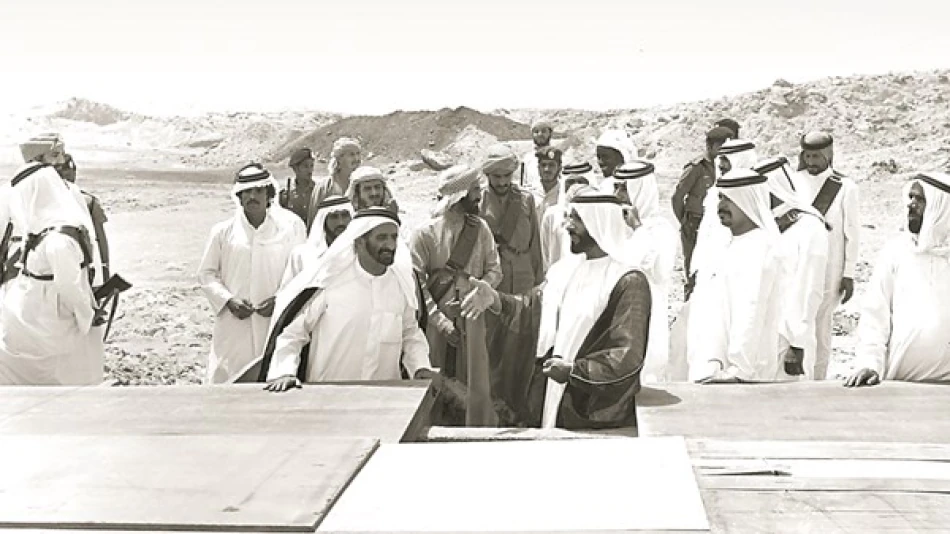
Driven by Parental Resolve, Youth Renew Commitment to Nation-Building
UAE's Young Professionals Pledge to Carry Forward Founding Vision on Union Day
As the UAE celebrates Union Day, a new generation of Emirati professionals—from petroleum engineers to aviation specialists—are redefining what it means to serve their nation. These young leaders view the day not merely as historical commemoration, but as a personal mandate to advance the UAE's position as a global hub for innovation, tolerance, and humanitarian leadership.
From Oil Fields to AI Labs: The New Face of Emirati Excellence
The testimonials from these professionals reveal how deeply the founding principles of Sheikh Zayed bin Sultan Al Nahyan have permeated modern Emirati society. Jaber Bati Al Ahbabi, a petroleum engineer at ADNOC and head of the National Volunteer Team, exemplifies this integration of national service with professional excellence. His dual role—supporting energy sustainability while leading community volunteer initiatives—reflects the UAE's broader strategy of balancing economic development with social cohesion.
This approach mirrors successful models in other Gulf states, but the UAE's emphasis on volunteerism as a patriotic duty sets it apart. Unlike Qatar's more state-directed development model or Saudi Arabia's Vision 2030 reforms, the UAE has cultivated a culture where individual initiative directly serves national objectives.
Breaking Barriers: Women Leading Technical Innovation
Marwa Said Al Maamari, an aviation engineer specializing in artificial intelligence applications, and Dr. Suad Al Shamsi, an aviation consultant and AI researcher, represent the UAE's strategic investment in women's technical education. Both hold advanced degrees from international institutions and serve on global scientific committees—a testament to the UAE's early recognition that gender equality drives innovation.
Their achievements are particularly significant given the region's historical challenges with women's participation in STEM fields. The UAE's approach—providing international education opportunities while maintaining cultural values—has proven more sustainable than top-down mandates seen elsewhere in the region.
Maritime and Industrial Frontiers
Sahar Rasti, a naval captain and entrepreneur, and Khawla Mohammed Al Marzouqi, the first woman to work on a land drilling platform at ADNOC Drilling, demonstrate how the UAE is systematically dismantling gender barriers in traditionally male-dominated industries.
Al Marzouqi's role is particularly noteworthy—the oil and gas sector globally has struggled with gender diversity, yet the UAE is positioning itself as a regional leader in this transformation. This mirrors Norway's success in the offshore sector, where deliberate policies increased women's participation from negligible levels to significant representation within two decades.
Strategic Implications for the UAE's Future
These individual stories reflect broader strategic calculations. The UAE's leadership recognizes that the nation's small population requires maximum utilization of human capital. By ensuring women participate fully in technical fields, the UAE effectively doubles its pool of potential innovators and leaders.
Moreover, these professionals' international credentials—from UK universities to global scientific committees—position the UAE as a bridge between regional traditions and global innovation networks. This hybrid approach has proven crucial in sectors like aviation, where the UAE's airlines and airports have become global benchmarks.
The Economic Logic Behind Cultural Values
The emphasis on volunteerism and national service among these professionals isn't merely cultural—it's economically strategic. Countries with strong civic engagement typically show higher productivity, better governance, and more resilient economies. Singapore's model of national service creating cross-sector networks has been studied extensively, and the UAE appears to be adapting this concept for its own context.
The integration of AI research, aviation safety, and energy sustainability in these professionals' work also aligns with the UAE's economic diversification goals. As oil revenues become less reliable long-term, the UAE is building expertise in sectors that will define the next economic era.
Global Positioning Through Individual Excellence
These young professionals serve as informal ambassadors, representing the UAE in international forums and competitions. Dr. Al Shamsi's role as a judge for the James Dyson Award and Al Maamari's recognition among "Distinguished Emirati Women" create soft power advantages that complement the UAE's formal diplomatic efforts.
This strategy of leveraging individual excellence for national branding has proven effective for countries like South Korea, whose professionals in technology and entertainment have significantly enhanced the nation's global image. The UAE appears to be pursuing a similar approach across multiple sectors simultaneously.
As these professionals take on leadership roles in their respective fields, they carry forward not just technical expertise but a model of development that balances rapid modernization with cultural continuity—a formula that could prove influential across the developing world.
Most Viewed News

 Layla Al Mansoori
Layla Al Mansoori






